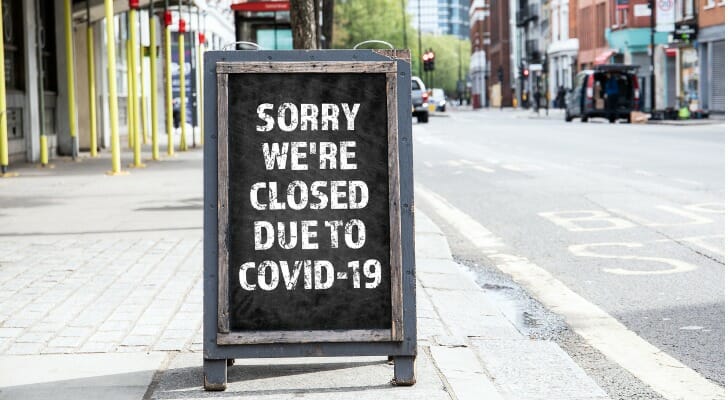Paycheck Protection Program (PPP) Loans
With stay-at-home orders in place across the U.S., revenues for the nation’s 30 million small business have dried up, and many businesses have had to lay off employees. To aid these companies and their employees...Thursday, April 2nd 2020, 11:11 am
By Mark Henricks
 With stay-at-home orders in place across the U.S., revenues for the nation’s 30 million small business have dried up, and many businesses have had to lay off employees. To aid these companies and their employees during the COVID-19 crisis, the Small Business Administration (SBA) is offering small businesses a forgivable loan of up to $10 million each to cover payroll and some other costs.
With stay-at-home orders in place across the U.S., revenues for the nation’s 30 million small business have dried up, and many businesses have had to lay off employees. To aid these companies and their employees during the COVID-19 crisis, the Small Business Administration (SBA) is offering small businesses a forgivable loan of up to $10 million each to cover payroll and some other costs.
A Paycheck Protection Program (PPP) loan, which the SBA classifies as a 7(a) loan, is part of the $2 trillion Coronavirus Aid, Relief, and Economic Security Act (CARES) Act, with $349 billion designated for the PPP. The loans feature a streamlined application process, less documentation and fewer restrictions. If you’re considering such a loan for your business, it’s important to understand who does and doesn’t qualify, how much you can borrow, how forgiveness works and other key details.
Who Qualifies for a PPP Loan?Any small business with 500 or fewer employees may be eligible. This includes small businesses, sole proprietors, S corporations, C corporations, LLCs, independent contractors, self-employed people and private nonprofits. In addition, some nonprofits, tribal groups and veteran groups are eligible.
Restaurants and hospitality businesses may qualify if they have 500 or fewer employees per location. Details on the size standards and exceptions are on the SBA website.
Ineligible businesses include those engaged in illegal activities, owners more than 60 days delinquent on child support obligations, farms and ranches, sex businesses, lobbyists and gambling establishments.
Do Venture Capital-Backed Startups Qualify for a PPP Loan?Startups, by definition, tend to have far fewer than 500 employees. But in the existing framework of the SBA’s 7(a) program, startups backed by venture capital firms may be required, in their application for a PPP loan, to count both their own employees and those of the VC firm and its other portfolio companies. That could push the employee count of the startup’s PPP loan application over 500 – effectively disqualifying it. As a general rule, though, such “affiliation rules” only apply if the VC firm owns more than 50% of the startup or if it exerts operational control over the startup.
But what if several VC firms own a combined 50% or more of the startup? Would that count as an affiliation? Existing SBA rules were not clear, but the Treasury released a modified set of rules for the PPP on April 3, 2020. You can read the new guidance here, but generally, it says no: several VC firms owning a majority of a startup’s equity does not make the startup their affiliate. In this situation, a qualified startup is eligible for a PPP loan. For more information, the National Venture Capital Association (NVCA) has issued detailed guidance on the question for its members.
Terms of a PPP LoanThe government’s efforts to help businesses has resulted in generous terms for PPP loans. Borrowers can receive two and a half times their average monthly payroll costs (excluding the pay for people who earn more than $100,000 per year) incurred 12 months before the date the loan is made. For example, if your monthly average payroll (excluding $100,000+ salaries) in the last 12 months is $10,000, you may borrow up to $25,000. The maximum any business can borrow is $10 million. This calculator gives an easy snapshot of what you can borrow:
The money can be used for payroll – no more than $100,000 annual salary per employee – as well as benefits (including paid sick leave and insurance premiums) and taxes on compensation. Up to 25% of the loan may be used by the business to cover mortgage interest, rent, utilities and interest on pre-existing loans.
The covered expenses have to be incurred from Feb. 15, 2020 through June 30, 2020. Businesses have to have been in business by Feb. 15, 2020.
Any portion of the loan that is not forgiven will carry an interest rate of 1.0% and is due to be paid back within two years. However, payments for the first six months can be deferred. There’s no pre-payment penalty.
PPP Loan ForgivenessBorrowers will have their loans forgiven if they use the money for designated expenses. Participants are eligible for loan forgiveness for the amounts spent over the eight weeks after receiving the loan.
The amount of forgiveness is equal to the total amount of payments for payroll, mortgage interest, rent and utilities. It is anticipated that no more than 25% of the forgiven amount may be for non-payroll costs.
To get the entire amount of the loan forgiven, the full-time employee headcount cannot decline, nor can employers cut salaries or wages.
The SBA will use a sliding scale to reduce the amount eligible for forgiveness depending on how many employees are retained. If businesses rehire laid off workers by June 30, they won’t be penalized.
Another provision of the program allows borrowers who already have disaster assistance loans to defer payments through Dec. 31. This is an automatic deferment. Borrowers don’t have to do anything to qualify for it.
The SBA has a summary of loan terms here.
When and How to Apply Banks, primarily community banks, began accepting PPP loan applications from small businesses and sole proprietorships starting April 3. Independent contractors and self-employed individuals, including freelancers, can apply beginning April 10. The program ends June 30, though borrowers are encouraged to apply as soon as possible.
Banks, primarily community banks, began accepting PPP loan applications from small businesses and sole proprietorships starting April 3. Independent contractors and self-employed individuals, including freelancers, can apply beginning April 10. The program ends June 30, though borrowers are encouraged to apply as soon as possible.
Borrowers can apply to any SBA-approved lender, including participating commercial banks and credit unions. A list of approved lenders can be found on the SBA website. Note that many lenders may limit eligibility to those businesses with whom they have a preexisting relationship, such as previous loans or a business checking account. Check out our list of participating banks and their requirements (we will continually update it).
The program also provides for waivers that would normally be applied to SBA loans. Those include waivers for fees charged to borrowers and lenders, as well as prepayment fees. A requirement that borrowers also have credit elsewhere is likewise being waived for this program. There are no requirements for collateral or personal guarantees.
Business owners must submit applications to a participating bank, but you can find a sample application at the SBA website. The SBA estimates the application process should take about two hours and 10 minutes. However, this is assuming all required documents are available. It may take a few days to gather the necessary paperwork.
The SBA says applications will be evaluated the same day they are received. However, details about how this will work are not finalized and loan application volume is expected to be heavy.
The Bottom LineThe Payroll Protection Program aims to loan up to $349 billion to small businesses and independent contractors who maintain employee count during the COVID-19 crisis. The lending program uses a streamlined, low-documentation process and promises quick turnaround. And, if qualifying employers don’t lay off employees or cut wages, the loans can be forgiven, effectively making this a grant.
The PPP loan program is one of many government programs to help small businesses. And private initiatives, such as Facebook grants, are also available.
Tips for Business Owners During the Coronavirus Crisis- Many financial advisors specialize in working with business owners. Finding the right financial advisor that fits your needs doesn’t have to be hard. SmartAsset’s free tool matches you with financial advisors in your area in five minutes. If you’re ready to be matched with local advisors that will help you achieve your financial goals, get started now.
- In addition to the new PPP loan, the SBA also has other loan programs to help small businesses, including Economic Injury Disaster Loans (EIDLs).
Photo credit: ©iStock.com/andresr, ©iStock.com/tumsasedgars, ©iStock.com/ela bracho
The post Paycheck Protection Program (PPP) Loans appeared first on SmartAsset Blog.
Information contained on this page is provided by an independent third-party content provider. Frankly and this Site make no warranties or representations in connection therewith. If you are affiliated with this page and would like it removed please contact pressreleases@franklymedia.com
More Like This
April 2nd, 2020
April 25th, 2024
April 25th, 2024
Top Headlines
April 25th, 2024
April 25th, 2024







